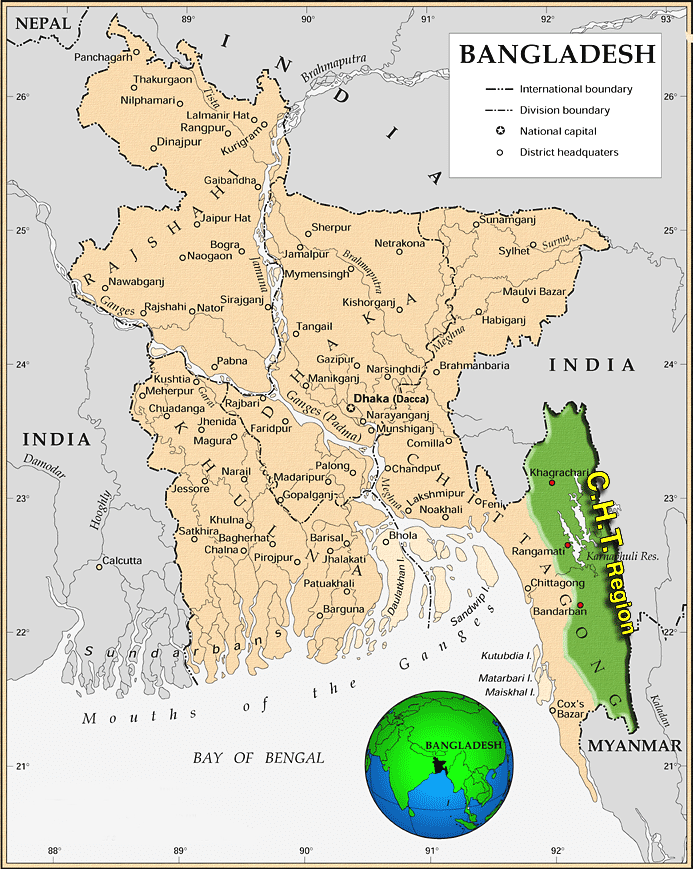Governance
Challenges Faced by Chin-Kuki-Mizo Group
- 30 Jan 2023
- 8 min read
Prelims: Refugee in India, 1951 Refugee Conference, Foreigners Act of 1946, Citizenship Amendment Act, 2019 (CAA), Rohingya Refugee, United Nations High Commissioner for Refugees.
Mains: Challenges Faced by Chin-Kuki-Mizo Group, Refugee Crisis, India’s Refugee Policy.
Why in News?
Recently, the Zo Reunification Organisation (ZORO), representing the Chin-Kuki-Mizo communities, has sought the help from India in ending the “policy of extermination” of Ethnic Minorities inhabiting the Chittagong Hill Tracts (CHT) of Bangladesh.
- More than 300 people belonging to the Chin-Kuki-Mizo group have taken shelter in Mizoram’s Lawngtlai district since November 2022, following an alleged offensive by the Bangladesh army in collusion with the Arakan Army, a Rohingya Muslim extremist group.
What are the Issues faced by Chin-Kuki-Mizo Group in Bangladesh?
- The constitutional and human rights of the indigenous Kuki-Chin tribes, are being violated in the CHT with impunity under a policy of the Bangladesh army to exterminate them.
- CHT is a 13,000 sq. km hilly and forested area in south-eastern Bangladesh, bordering India's Mizoram and Tripura and Myanmar's Chin and Rohingya-inhabited Rakhine States.
- The pre-British CHT had self-governing chiefdoms and chieftaincies. The population of these groups was categorised either as the Khyoungtha, tribes who live along the river banks, or the Toungtha, tribes who live in the thick jungles of the hills.
- The tribes remained beyond the realms of Hindu kings and Muslim nawabs, but the annexation of the CHT by the British in 1860 made them vulnerable to external pressures.
- The British gave special constitutional status to the CHT to protect the identity, customs, culture, tradition and ancestral land of the tribes. The restrictive laws were, however, repealed by 1903 to let the dwellers of the plains infiltrate the areas of the highlanders.
- Contrary to the expectations of the indigenous people, the CHT was merged with Pakistan in 1947, all the indigenous tribes began to face discrimination in all aspects of life.
- While the tribal population of the CHT declined drastically, the government of Bangladesh encroached upon the ancestral land of the indigenous tribes, particularly the Kuki-Chin people, in the name of promoting tourism.
What are their Demands?
- The Kuki-Chin tribes of the CHT have been demanding a separate State due to the large-scale influx of non-tribal people into the hills. But the Bangladesh government chose to step up its oppressive measures.
- The ZORO asked India to advise his Bangladeshi counterpart to declare a ceasefire with the Kuki-Chin National Army (KNA) and stop abusing the rights of the Kuki-Chin people in the CHT.
- The organisation also appealed India to direct the Ministry of Home Affairs and the Border Security Force not to drive away the Kuki-Chin people who are fleeing Bangladesh and taking refuge among their “blood-related tribes” in Mizoram.
What is India’s Refugee Policy?
- India lacks specific legislation to address the problem of refugees, in spite of their increasing inflow.
- India is not a party to the 1951 Refugee Convention and its 1967 Protocol, the key legal documents pertaining to refugee protection.
- However, India has had a stellar record on the issue of refugee protection. India has a moral tradition for assimilating foreign people and culture.
- Further, the constitution of India also respects the life, liberty, and dignity of human beings.
- The Supreme Court in the National Human Rights Commission vs. State of Arunachal Pradesh (1996) held that “while all rights are available to citizens, persons including foreign citizens are entitled to the right to equality and the right to life, among others.”
- Further, Article 21 of the Constitution encompasses the right of non-refoulement.
- Non-refoulement is the principle under international law which states that a person fleeing persecution from his own country should not be forced to return to his own country.
What is the Status of Refugees in India?
- Since its independence, India has accepted various groups of refugees from neighbouring countries, including:
- Partition refugees from Pakistan in 1947.
- Tibetan refugees that arrived in 1959.
- Chakma and Hajong from present day Bangladesh in early 1960s.
- Other Bangladeshi refugees in 1965 and 1971.
- Sri Lankan Tamil refugees from the 1980s.
- Rohingya refugees from Myanmar.
What is the Current Legislative Framework to Handle Refugees?
- Foreigners Act of 1946: Under Section 3, the Central government is empowered to detect, detain and deport illegal foreign nationals.
- Passport (Entry into India) Act, 1920: Under Section 5, authorities can remove an illegal foreigner by force under Article 258(1) of the Constitution of India.
- Registration of Foreigners Act of 1939: Under this, there is a mandatory requirement under which all foreign nationals (excluding overseas citizens of India) visiting India on a long-term visa (more than 180 days) is required to register themselves with a Registration Officer within 14 days of arriving in India.
- Foreign registration was mandated and is regulated by the Registration of Foreigners Act, 1939 and the Registration of Foreigners Rules, 1992.
- Citizenship Act, 1955: It provided provisions for renunciation, termination, and deprivation of citizenship.
- Further, Citizenship Amendment Act, 2019 (CAA) seeks to provide citizenship only to Hindu, Christian, Jain, Parsi, Sikh, and Buddhist immigrants persecuted in Bangladesh, Pakistan, and Afghanistan.
UPSC Civil Services Examination Previous Year Question (PYQ)
Prelims
Q. Consider the following pairs: (2016)
| Community sometimes mentioned in the news | In the affairs of | |
| 1. | Kurd | Bangladesh |
| 2. | Madhesi | Nepal |
| 3. | Rohingya | Myanmar |
Which of the pairs given above is/are correctly matched?
(a) 1 and 2
(b) 2 only
(c) 2 and 3
(d) 3 only
Ans- (c)
Mains
Q. How does illegal transborder migration pose a threat to India’s security? Discuss the strategies to curb this, bringing out the factors which give impetus to such migration. (2014)







